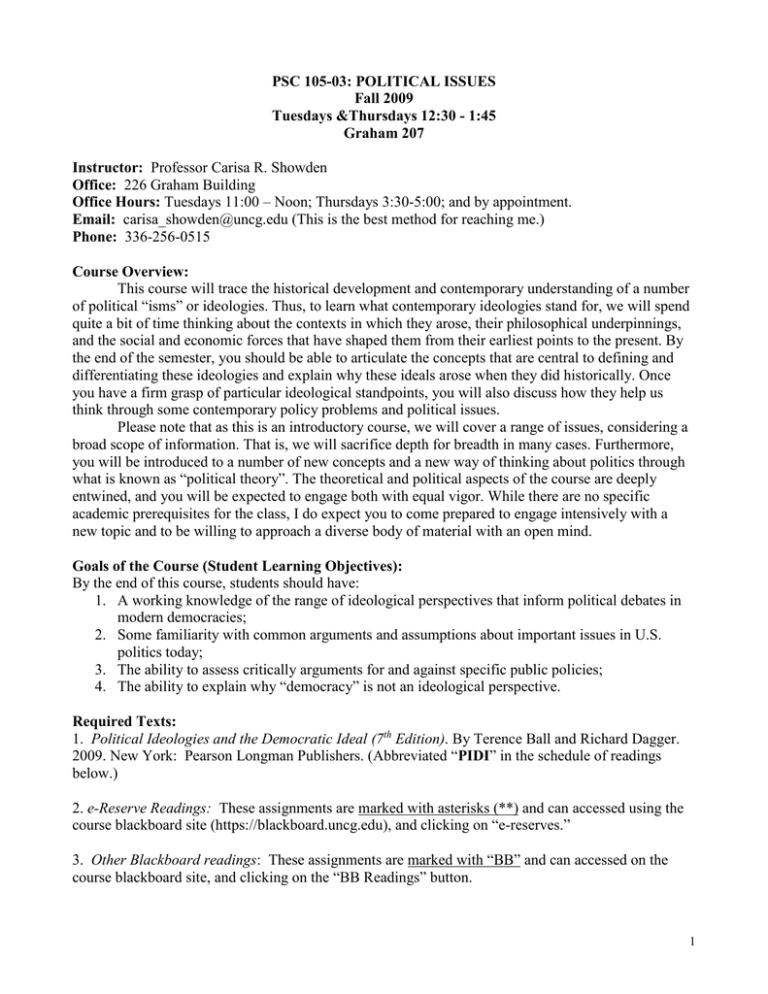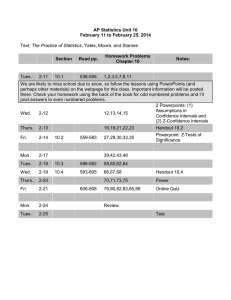
PSC 105-03: POLITICAL ISSUES
Fall 2009
Tuesdays &Thursdays 12:30 - 1:45
Graham 207
Instructor: Professor Carisa R. Showden
Office: 226 Graham Building
Office Hours: Tuesdays 11:00 – Noon; Thursdays 3:30-5:00; and by appointment.
Email: carisa_showden@uncg.edu (This is the best method for reaching me.)
Phone: 336-256-0515
Course Overview:
This course will trace the historical development and contemporary understanding of a number
of political “isms” or ideologies. Thus, to learn what contemporary ideologies stand for, we will spend
quite a bit of time thinking about the contexts in which they arose, their philosophical underpinnings,
and the social and economic forces that have shaped them from their earliest points to the present. By
the end of the semester, you should be able to articulate the concepts that are central to defining and
differentiating these ideologies and explain why these ideals arose when they did historically. Once
you have a firm grasp of particular ideological standpoints, you will also discuss how they help us
think through some contemporary policy problems and political issues.
Please note that as this is an introductory course, we will cover a range of issues, considering a
broad scope of information. That is, we will sacrifice depth for breadth in many cases. Furthermore,
you will be introduced to a number of new concepts and a new way of thinking about politics through
what is known as “political theory”. The theoretical and political aspects of the course are deeply
entwined, and you will be expected to engage both with equal vigor. While there are no specific
academic prerequisites for the class, I do expect you to come prepared to engage intensively with a
new topic and to be willing to approach a diverse body of material with an open mind.
Goals of the Course (Student Learning Objectives):
By the end of this course, students should have:
1. A working knowledge of the range of ideological perspectives that inform political debates in
modern democracies;
2. Some familiarity with common arguments and assumptions about important issues in U.S.
politics today;
3. The ability to assess critically arguments for and against specific public policies;
4. The ability to explain why “democracy” is not an ideological perspective.
Required Texts:
1. Political Ideologies and the Democratic Ideal (7th Edition). By Terence Ball and Richard Dagger.
2009. New York: Pearson Longman Publishers. (Abbreviated “PIDI” in the schedule of readings
below.)
2. e-Reserve Readings: These assignments are marked with asterisks (**) and can accessed using the
course blackboard site (https://blackboard.uncg.edu), and clicking on “e-reserves.”
3. Other Blackboard readings: These assignments are marked with “BB” and can accessed on the
course blackboard site, and clicking on the “BB Readings” button.
1
Assignments/Course Requirements:
Three (3) In-Class Exams: 15% each (45% total)
Four (4) Unit Quizzes: 8% each (32% total)
Final Exam: 23%
In-Class Exams
o All exams will be held in class on the days indicated in the course schedule below.
o Exams will include multiple-choice and short answer questions.
o Exam One will cover Unit One.
o Exam Two will cover Units Two and Three.
o Exam Three will cover Units Four and Five
Unit Quizzes
o All four quiz days are noted in the schedule of readings and class meetings below.
o Quizzes are to be taken ON-LINE—on the course Blackboard page.
o Quizzes can be accessed by clicking on the “Quizzes” Button and then on the appropriate
link.
o Quizzes are TIMED. You will not have time to look up information while taking the
quizzes. Study in advance.
o Quizzes will become available to you once the class meeting for that day has ended and will
remain available until 11:59 p.m. on the day of the quiz. But note well: while you can log
back into the quiz if you need to switch computers or go off-line for some reason while
you’re in the middle of taking the quiz, once you have submitted an answer to a question,
you cannot go back and change it.
Final Exam
o The final exam will be comprehensive, covering all six units of the course.
o The final exam will be held in our regular classroom during our university-scheduled final
exam period.
o The final exam schedule is set by the university long before the start of the semester. You
are expected to make your semester break travel arrangements to accommodate your final
exams. Your final exams are not scheduled at your traveling convenience.
A Note on Attendance and Participation
o I take attendance and note participation daily, and I take seriously the advice offered to you
in the Undergraduate Bulletin:
o “Regular class attendance is a responsibility and a privilege of university education. It is
fundamental to the orderly acquisition of knowledge. Students should recognize the
advantages of regular class attendance, accept it as a personal responsibility, and apprise
themselves of the consequences of poor attendance.” (Undergraduate Bulletin:
http://www.uncg.edu/reg/Catalog/current/AcaRegs/ClassAttendance.html)
o Further, the Undergraduate Bulletin stipulates that I am responsible for the “exaction of
penalties for unsatisfactory class attendance. Possible penalties are lowering the course
grade, including a grade of F, and, in extreme circumstances, dropping the student from the
course.”
o You can take up to 4 absences for whatever reasons you choose. At absence #5, your
course grade will drop by 5 points. Each subsequent absence after that will result in another
5 point drop in your final grade. Further, while there is no formal “participation” grade in
this class, demonstrating engagement with the readings and lectures by asking questions,
responding to questions, and positively contributing to class discussions throughout the
term may help grades in borderline cases.
2
Schedule of Class Meetings and Readings:
Tues. Aug. 25th:
Course Introduction
Unit One: Politics, Ideology, and Democracy
Thurs. Aug. 27th:
PIDI, Chapter One: “Ideology and Ideologies”
Tues. Sept. 1st:
PIDI, Chapter Two: “The Democratic Ideal”
Thurs. Sept. 3rd:
Class Cancelled. (American Political Science Association meeting)
Tues. Sept. 8th :
Benjamin Barber: “The Four Myths of Democracy”(BB)
John Adams excerpt: “What is a Republic?”**
J. S. Mill excerpt: “Democratic Participation and Political Education” **
Thurs. Sept. 10th:
“Should the Electoral College Be Abolished?”**
Tues. Sept. 15th:
“Is Democracy the Answer to Global Terrorism?”**
Thurs. Sept. 17th:
EXAM ONE
Unit Two: Liberalism
Tues. Sept. 22nd:
PIDI, Chapter Three: “Liberalism” (pp. 45-66)
Declaration of Independence**
Thurs. Sept. 24th:
PIDI, Chapter Three: “Liberalism” (pp. 66-92)
Tues. Sept. 29th:
J. S. Mill excerpt “Liberty and Individuality”**
T. H. Green excerpt: “Liberalism and Positive Freedom”**
Donald Allen excerpt: “Paternalism vs. Democracy: A Libertarian View”**
Thurs. Oct. 1st:
“Affirmative Action” (CQ Researcher) (BB)
Take Quiz #1
Unit Three: Conservatism
Tues. Oct. 6th:
PIDI, Chapter Four: “Conservatism” (pp. 93-102)
E. Burke excerpt: “Society, Reverence, and the ‘True Natural Aristocracy’”**
Thurs. Oct. 8th:
PIDI, Chapter Four: “Conservatism” (pp. 102-124)
Michael Oakeshott excerpt: “On Being Conservative”**
Irving Kristol excerpt: “The Neoconservative Persuasion”**
Take Quiz #2
Tues. Oct. 13th:
FALL BREAK. NO CLASS MEETING
3
Thurs. Oct. 15th :
“Legalizing Marijuana” (CQ Researcher) (BB)
Tues. Oct. 20th:
EXAM TWO
Unit Four: Socialism and Communism
Thurs. Oct. 22nd:
PIDI, Chapter Five: “Socialism and Communism: More to Marx”
Tues. Oct. 27th:
PIDI, Chapter Six: “Socialism and Communism After Marx”
Thurs. Oct. 29th:
Carol Gould excerpt: “Socialism and Democracy”**
Michael Walzer excerpt: Town Meetings and Workers’ Control**
Michael D. Yates: “Can the Working Class Save the World?”**
Tues. Nov. 3rd:“
“Middle Class Squeeze” (CQ Researcher) (BB)
Take Quiz #3
Unit Five: Environmentalism (“Green Politics”)
Thurs. Nov. 5th:
PIDI, Chapter Nine: “ ‘Green’ Politics: Ecology as Ideology”
Aldo Leopold excerpt: “The Land Ethic”**
Dave Foreman excerpt: “Putting the Earth First”**
Tues. Nov. 10th:
“Buying Green” (CQ Researcher) (BB)
Shoumatoff, “An Eco-System of One’s Own”**
Thurs. Nov. 12th:
“Smart Growth” (CQ Researcher) (BB)
Tues. Nov. 17th:
EXAM THREE
Unit Six: Radical Islamism & The Future of Ideology
Thurs. Nov. 19th:
PIDI, Chapter Ten: “Radical Islamism”
Ayatollah Ruholla Khomeini excerpt: “The Necessity for Islamic Government”**
Tues. Nov. 24th:
“Understanding Islam” (CQ Researcher) (BB)
Thurs. Nov. 26th:
THANKSGIVING BREAK. NO CLASS MEETING.
Tues. Dec. 1st:
PIDI, Chapter Eleven: “The Future of Ideology”
Benjamin Barber: “Jihad vs. McWorld” (BB)
Take Quiz #4
Thurs. Dec. 3rd:
Course Wrap-Up. Final Exam Review
Thurs. Dec. 10th:
Noon – 3:00 p.m.: FINAL EXAM
4



